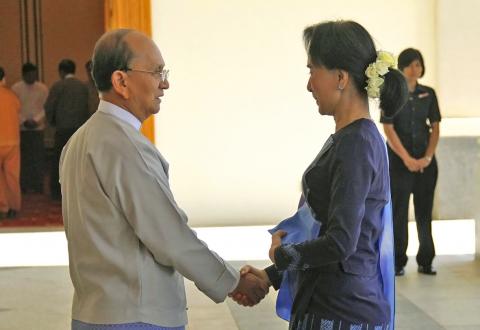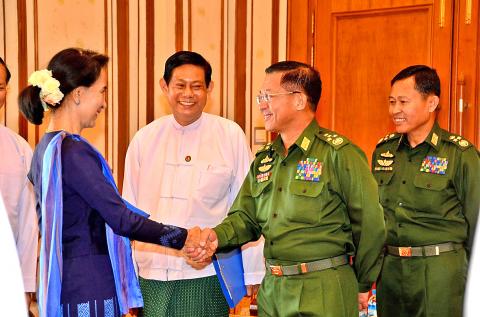Myanmar’s parliament is to consider amending the country’s constitution — which currently bars opposition leader Aung San Suu Kyi from becoming president — ahead of crucial elections next year, an official said yesterday.
Aung San Suu Kyi is trying to change key sections of Myanmar’s charter ahead of next year’s polls, which are widely expected to be won by her National League for Democracy (NLD), if they are free and fair, after decades of disastrous military rule.
The move to consider constitutional reform was discussed during unprecedented talks between Burmese President Thein Sein and his political rivals, including Aung San Suu Kyi, as well as top army leadership and election officials.

Photo: Reuters
“They agreed to discuss the issue of amending the constitution in parliament, according to the law,” presidential spokesman Ye Htut told reporters after the meeting in the capital, Naypyidaw.
The National League for Democracy has focused on altering a provision in the constitution that ensures the military in the former junta-ruled nation has a veto on any amendment to the charter.
It believes revising the clause would open the way for further changes to other constitutional provisions, including the ring-fenced proportion of soldiers in parliament and the effective prohibition on Aung San Suu Kyi leading the nation. Ye Htut did not elaborate on which elements of the constitution were up for debate.

Photo: EPA
As it stands, Aung San Suu Kyi is ineligible to become president because of a clause in the 2008 charter blocking anyone from leading the country whose spouse or children are overseas citizens. The Nobel laureate’s late husband was British, as are her two sons.
To alter the constitution, there needs to be support from a 75 percent majority in parliament, and as unelected soldiers make up a quarter of the legislature they have the last say on any changes.
Yesterday’s extraordinary talks — the first of their kind as the nation emerges from decades of outright military rule — saw Thein Sein and Aung San Suu Kyi walk into the meeting together.
The discussions, which lasted for more than two hours, came a day after the White House said US President Barack Obama spoke to Thein Sein and Aung San Suu Kyi about the elections, which are seen as a key test of democratic reforms under the quasi-civilian government.
Obama “underscored the need for an inclusive and credible process for conducting the 2015 elections” during telephone talks with the Burmese president, a White House statement said on Thursday.
The US leader also spoke to Aung San Suu Kyi about how Washington can “support efforts to promote tolerance, respect for diversity, and a more inclusive political environment,” it said.

The CIA has a message for Chinese government officials worried about their place in Chinese President Xi Jinping’s (習近平) government: Come work with us. The agency released two Mandarin-language videos on social media on Thursday inviting disgruntled officials to contact the CIA. The recruitment videos posted on YouTube and X racked up more than 5 million views combined in their first day. The outreach comes as CIA Director John Ratcliffe has vowed to boost the agency’s use of intelligence from human sources and its focus on China, which has recently targeted US officials with its own espionage operations. The videos are “aimed at

STEADFAST FRIEND: The bills encourage increased Taiwan-US engagement and address China’s distortion of UN Resolution 2758 to isolate Taiwan internationally The Presidential Office yesterday thanked the US House of Representatives for unanimously passing two Taiwan-related bills highlighting its solid support for Taiwan’s democracy and global participation, and for deepening bilateral relations. One of the bills, the Taiwan Assurance Implementation Act, requires the US Department of State to periodically review its guidelines for engagement with Taiwan, and report to the US Congress on the guidelines and plans to lift self-imposed limitations on US-Taiwan engagement. The other bill is the Taiwan International Solidarity Act, which clarifies that UN Resolution 2758 does not address the issue of the representation of Taiwan or its people in

US Indo-Pacific Commander Admiral Samuel Paparo on Friday expressed concern over the rate at which China is diversifying its military exercises, the Financial Times (FT) reported on Saturday. “The rates of change on the depth and breadth of their exercises is the one non-linear effect that I’ve seen in the last year that wakes me up at night or keeps me up at night,” Paparo was quoted by FT as saying while attending the annual Sedona Forum at the McCain Institute in Arizona. Paparo also expressed concern over the speed with which China was expanding its military. While the US

SHIFT: Taiwan’s better-than-expected first-quarter GDP and signs of weakness in the US have driven global capital back to emerging markets, the central bank head said The central bank yesterday blamed market speculation for the steep rise in the local currency, and urged exporters and financial institutions to stay calm and stop panic sell-offs to avoid hurting their own profitability. The nation’s top monetary policymaker said that it would step in, if necessary, to maintain order and stability in the foreign exchange market. The remarks came as the NT dollar yesterday closed up NT$0.919 to NT$30.145 against the US dollar in Taipei trading, after rising as high as NT$29.59 in intraday trading. The local currency has surged 5.85 percent against the greenback over the past two sessions, central